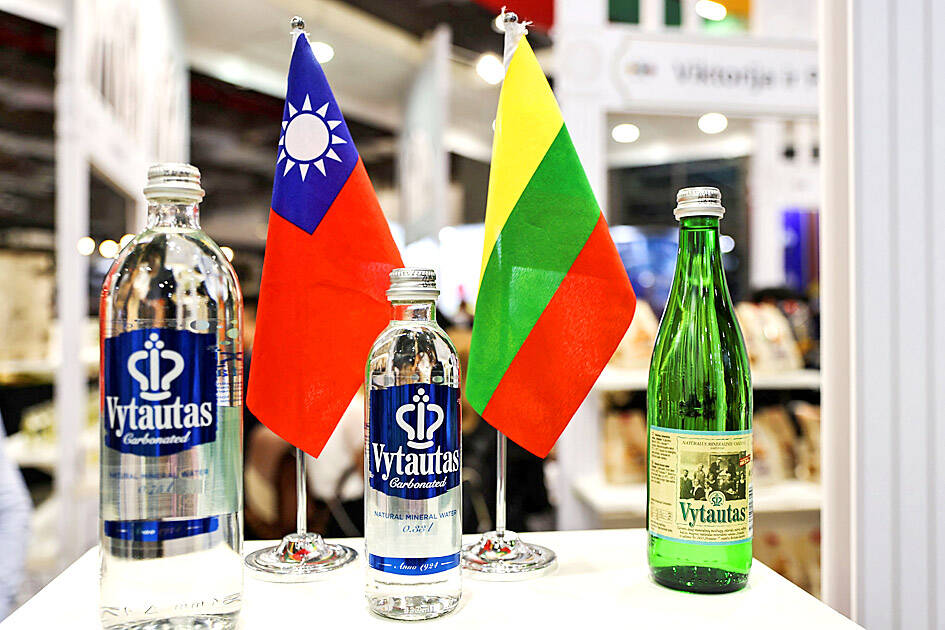Taiwanese and Lithuanian state financial institutions have signed an agreement to guarantee loans to Lithuanian importers of Taiwanese products, the Ministry of Economic Affairs said yesterday.
The agreement was signed on Aug. 23 by the Export-Import Bank of the ROC (Eximbank, 輸出入銀行) and Investment and Business Guarantees Ltd (INVEGA).
Under the deal, INVEGA would provide loans to small and medium-sized enterprises (SMEs) in Lithuania for the purchase of Taiwanese goods, while Eximbank would guarantee up to 70 percent of the loan amount, the ministry said.

Photo: Ann Wang, Reuters
Eximbank helps boost Taiwan’s import and export trade by offering financial services such as export credit insurance and extending credit lines to domestic and foreign financial institutions, which then relend the funds to their clients for the importation of Taiwanese products.
INVEGA’s main objectives include providing financial services and support to SMEs, with the primary goal of facilitating their access to funding.
The agreement marks Eximbank’s first pact with a foreign financial institution on loan guarantees.
The ministry said it would provide funding to Eximbank to guarantee INVEGA loans for up to five years, with preferential service fees for Lithuanian SMEs, and to offer export insurance to Taiwanese exporters.
Under the agreement, when a Taiwanese exporter receives an order from a Lithuanian importer, the latter would be referred to INVEGA to access funding, if necessary, the ministry said.
Taiwanese exporters would be offered a guarantee of up to 90 percent of the loan amount to buy raw materials for the production of goods for shipment to their customers in Lithuania, it said.
In a separate statement, Eximbank said it would also provide tailored loan guarantees to Lithuania businesses, while shouldering some of the export risks for Taiwanese exporters, in accordance with the agreement.
The agreement is expected to provide incentives for Lithuanian importers to buy more Taiwanese products, helping boost Taiwan’s exports, Eximbank said.
The deal is backed by the economics ministry, the National Development Council, the Ministry of Foreign Affairs, the Financial Supervisory Commission and the Taiwanese Representative Office in Lithuania, the bank said.
Noting that Lithuania is poised to open a trade office in Taiwan, Eximbank said the agreement would be a congratulatory gift.
Eximbank and INVEGA signed a memorandum of understanding on a loan guarantee system in June, during a visit to Taipei by a Lithuanian delegation led by Vice Minister of the Economy and Innovation Jovita Neliupsiene.
In the first six months of this year, Taiwan’s exports to Lithuania grew 15.29 percent from a year earlier to US$64.42 million, Eximbank said, citing Customs Administration data.
Last year, Taiwan’s imports from Lithuania rose 20.91 percent annually to about US$132 million, the bank said.

IN THE AIR: While most companies said they were committed to North American operations, some added that production and costs would depend on the outcome of a US trade probe Leading local contract electronics makers Wistron Corp (緯創), Quanta Computer Inc (廣達), Inventec Corp (英業達) and Compal Electronics Inc (仁寶) are to maintain their North American expansion plans, despite Washington’s 20 percent tariff on Taiwanese goods. Wistron said it has long maintained a presence in the US, while distributing production across Taiwan, North America, Southeast Asia and Europe. The company is in talks with customers to align capacity with their site preferences, a company official told the Taipei Times by telephone on Friday. The company is still in talks with clients over who would bear the tariff costs, with the outcome pending further

A proposed 100 percent tariff on chip imports announced by US President Donald Trump could shift more of Taiwan’s semiconductor production overseas, a Taiwan Institute of Economic Research (TIER) researcher said yesterday. Trump’s tariff policy will accelerate the global semiconductor industry’s pace to establish roots in the US, leading to higher supply chain costs and ultimately raising prices of consumer electronics and creating uncertainty for future market demand, Arisa Liu (劉佩真) at the institute’s Taiwan Industry Economics Database said in a telephone interview. Trump’s move signals his intention to "restore the glory of the US semiconductor industry," Liu noted, saying that

NEGOTIATIONS: Semiconductors play an outsized role in Taiwan’s industrial and economic development and are a major driver of the Taiwan-US trade imbalance With US President Donald Trump threatening to impose tariffs on semiconductors, Taiwan is expected to face a significant challenge, as information and communications technology (ICT) products account for more than 70 percent of its exports to the US, Chung-Hua Institution for Economic Research (CIER, 中華經濟研究院) president Lien Hsien-ming (連賢明) said on Friday. Compared with other countries, semiconductors play a disproportionately large role in Taiwan’s industrial and economic development, Lien said. As the sixth-largest contributor to the US trade deficit, Taiwan recorded a US$73.9 billion trade surplus with the US last year — up from US$47.8 billion in 2023 — driven by strong

STILL UNCLEAR: Several aspects of the policy still need to be clarified, such as whether the exemptions would expand to related products, PwC Taiwan warned The TAIEX surged yesterday, led by gains in Taiwan Semiconductor Manufacturing Co (TSMC, 台積電), after US President Donald Trump announced a sweeping 100 percent tariff on imported semiconductors — while exempting companies operating or building plants in the US, which includes TSMC. The benchmark index jumped 556.41 points, or 2.37 percent, to close at 24,003.77, breaching the 24,000-point level and hitting its highest close this year, Taiwan Stock Exchange (TWSE) data showed. TSMC rose NT$55, or 4.89 percent, to close at a record NT$1,180, as the company is already investing heavily in a multibillion-dollar plant in Arizona that led investors to assume